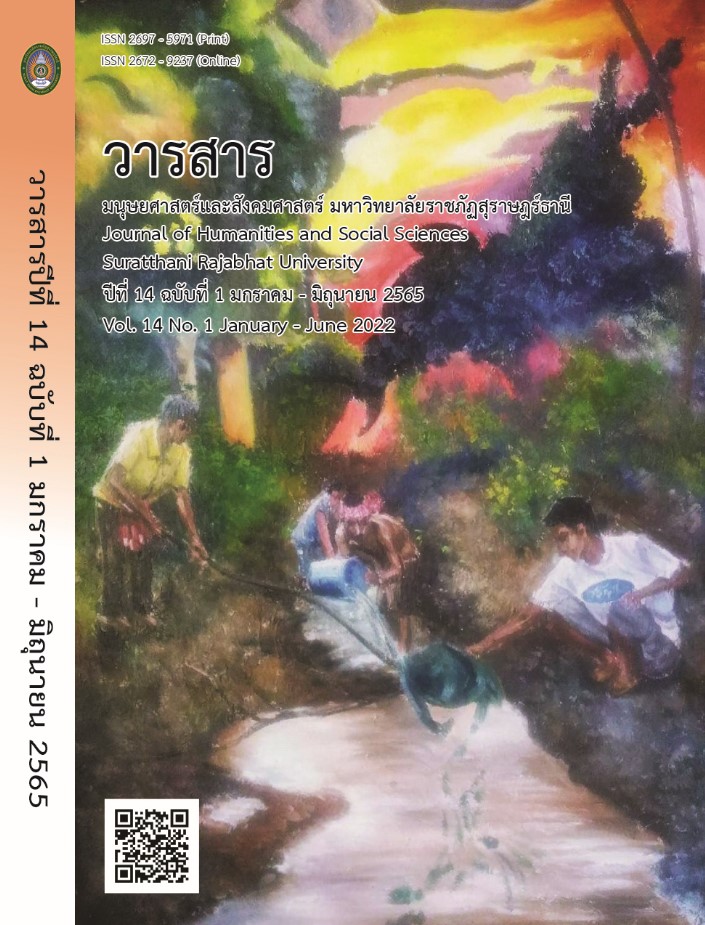The Concepts of the Thai Nation in Malai Chupinij’s Literary Works
Main Article Content
Abstract
This research aims to study the concept of the Thai nation in the literary works of Malai Chupinij and to examine the influence of the western concept of nation in Malai Chupinij's works of literature. The researcher collected data from Malai Chupinij's short stories and novels that have themes or reflect the Thai nation's perception. This research used the concept of the nation from Ernest Renan and the concept of imagined communities from Benedict Anderson as the conceptual framework for considering Malai Chupinij’s concept of nation. The research result was presented by using descriptive analysis. The result of this study found that five literary works of Malai Chupinij show the theme or reflect the perception of the Thai nation; Chewit deaw, Myung Nimit, Long Phrai: Jao Phandin, Long Phrai: Manut Naka and Long Phrai: Manut Himmapan. The above pieces of literature reflect the author's viewpoints on the Thai nation that 1) the Thai nation was formed by the integration of Thai people, the land of the Thai nation, Thai culture, and sovereignty of the Thai nation, 2) the land of Thai nation is fertile and safe for Thai people, 3) the Thai nation belongs to Thai people; therefore they must concern and protect the Thai nation as the nation's owner. Malai
Chupinij's concept of the nation reflects the influence of the concept of the nation-state and the government's public relations at that time. The Literary Works have shown the beginning of the author's imaginary community.
Article Details

This work is licensed under a Creative Commons Attribution-NonCommercial-NoDerivatives 4.0 International License.
All published manuscripts have been verified by peer-peer professors in the fields of humanities and social sciences. Reprinting of the article must be authorized by the editorial staff.
References
ฆัสรา ขมะวรรณ. (2542). Modernity, Modernism, Postmodernity, Postmodernism
บทสำรวจการนิยาม. วารสารสังคมศาสตร์, 30(2), 92 - 115.
จักรกริช สังขมณี. (2561). ชายแดนศึกษากับเขต - ขันธ์วิทยาของพื้นที่ใน/ระหว่าง.
กรุงเทพฯ: ศยาม.
ชาญวิทย์ เกษตรศิริ. (2559). ประวัติศาสตร์การเมืองไทยประเทศไทย พ.ศ. 2475 -
กรุงเทพฯ: มูลนิธิโครงการตำราสังคมศาสตร์และมนุษยศาสตร์.
ชูศักดิ์ ภัทรกุลวณิชย์. (2558). ชุมชนกับชาติ อำนาจกับความรัก ใน ทุ่งมหาราช.
อ่านใหม่. กรุงเทพฯ: อ่าน.
เชษฐา พวงหัตถ์. (2559). ว่าด้วยการทำความเข้าใจสภาวะสมัยใหม่. รูสมิแล, 37(3),
- 96.
ธงชัย วินิจจะกูล. (2546). “ภาวะอย่างไรหนอที่เรียกว่าศิวิไลซ์ เมื่อชนชั้นนำประเทศไทย
สมัยรัชกาลที่ 5 แสวงหาสถานะของตนเองผ่านการเดินทางและพิพิธภัณฑ์ทั้งใน
และนอกประเทศ”. รัฐศาสตร์สาร, 24(2), 1 - 66.
ธีรยุทธ บุญมี. (2546). ชาตินิยมและหลังชาตินิยม. กรุงเทพฯ: สายธาร.
ธเนศ อาภรณ์สุวรรณ. (2559). รายงานการวิจัยฉบับสมบูรณ์โครงการเมธีวิจัยอาวุโส
สกว. พัฒนาการและเปลี่ยนแปลงทางความคิดว่าด้วยความ (ไม่) เป็นสมัยใหม่
ในสังคมไทย. กรุงเทพฯ: สำนักงานกองทุนสนับสนุนการวิจัย.
นพพร ประชากุล. (2552). ยอกอักษร ย้อนความคิด เล่ม 2 ว่าด้วยสังคมศาสตร์และ
มนุษยศาสตร์. กรุงเทพฯ: อ่านและวิภาษา.
น้อย อินทนนท์. (2556ก). ล่องไพร ตอนป่าช้าช้าง เจ้าแผ่นดิน (พิมพ์ครั้งที่ 6). กรุงเทพฯ:
กระท่อม ป.ล.
น้อย อินทนนท์. (2556ข). ล่องไพร ตอนมนุษย์นาคา แดนสมิง หุบผามฤตยู (พิมพ์ครั้งที่
. กรุงเทพฯ: กระท่อม ป.ล.
น้อย อินทนนท์. (2556ค). ล่องไพร ตอนมนุษย์หิมพานต์ (พิมพ์ครั้งที่ 6). กรุงเทพฯ:
กระท่อม ป.ล.
เบน แอนเดอร์สัน. (2560). ชุมชนจินตกรรม บทสะท้อนว่าด้วยกำเนิดและการแพร่ขยาย
ของชาตินิยม. กรุงเทพฯ: มูลนิธิโครงการตำราสังคมศาสตร์และมนุษยศาสตร์.
รื่นฤทัย สัจจพันธุ์. (2549). ย้อนพินิจ เมืองนิมิตร ของมาลัย ชูพินิจ. วรรณวิทัศน์, 6(11),
- 138.
เรียมเอง. (2514). “ชีวิตเดียว” เรื่องสั้นของเรียมเอง. กรุงเทพฯ: รวมสาส์น.
เรียมเอง. (2543). เมืองนิมิตร (พิมพ์ครั้งที่ 3). กรุงเทพฯ: กระท่อม ป.ล.
สมิทธ์ ถนอมศาสนะ. (2558) การเปลี่ยนแปลงทางความคิดของชนชั้นกลางไทยกับ
“เรื่องอ่านเล่น” ไทยสมัยใหม่ทศวรรษ 2460 – ทศวรรษ 2480. วิทยานิพนธ์
ปร.ด. (ประวัติศาสตร์). กรุงเทพฯ: จุฬาลงกรณ์มหาวิทยาลัย.
สายชล สัตยานุรักษ์. (2550). ประวัติศาสตร์วิธีคิดเกี่ยวกับสังคมและวัฒนธรรมไทยของ
ปัญญาชน (พ.ศ. 2435 - 2535). กรุงเทพฯ: สำนักงานกองทุนสนับสนุนการ
วิจัย.
สุพรรณี วราทร. (2519). ประวัติศาสตร์นวนิยายไทยตั้งแต่สมัยเริ่มแรกจนถึง พ.ศ. 2475.
กรุงเทพฯ: โครงการตำราสังคมศาสตร์และมนุษยศาสตร์.
โสภา ชานะมูล. (2546). วาทกรรมเรื่อง “ชาติไทย” ของปัญญาชนหัวก้าวหน้าระหว่าง
พ.ศ. 2490 - 2505”. วิทยานิพนธ์ อ.ม. (ประวัติศาสตร์). กรุงเทพฯ:
จุฬาลงกรณ์มหาวิทยาลัย.
แอร์เนสต์ เรอนอง. (2561). ชาติคืออะไร [QU'EST-CE QU'UNE NATION?].
(นภ ดารารัตน์, ผู้แปล). กรุงเทพฯ: พารากราฟ.


